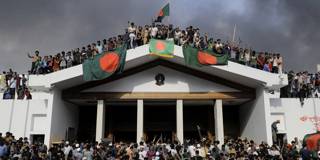The ouster of Bangladeshi Prime Minister Sheikh Hasina’s government is just the latest example of political volatility in South Asia – a region that has struggled to achieve stability, let alone democratization. This is generating acute security and economic risks for the region’s main power, India.
NEW DELHI – Violent student-led, Islamist-backed protests in Bangladesh have toppled Prime Minister Sheikh Hasina’s government, and mob attacks targeting those viewed as supporters of her secular Awami League party – in particular, the country’s dwindling Hindu minority – are proliferating. At a time when neighboring Myanmar is engulfed in violence and the Pakistan-Afghanistan belt remains fertile ground for cross-border terrorism, political upheaval in Bangladesh, two years after the overthrow of Sri Lanka’s government, is the last thing India, the regional power, needs.

NEW DELHI – Violent student-led, Islamist-backed protests in Bangladesh have toppled Prime Minister Sheikh Hasina’s government, and mob attacks targeting those viewed as supporters of her secular Awami League party – in particular, the country’s dwindling Hindu minority – are proliferating. At a time when neighboring Myanmar is engulfed in violence and the Pakistan-Afghanistan belt remains fertile ground for cross-border terrorism, political upheaval in Bangladesh, two years after the overthrow of Sri Lanka’s government, is the last thing India, the regional power, needs.